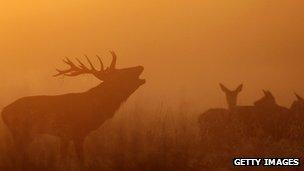MSPs hear calls for tougher deer controls
- Published

Many of the deer are on privately-owned sporting estates
MSPs have heard calls for the introduction of new legal measures which could force landowners to cull tens of thousands of deer.
Environmentalists said the move was needed to reduce damage to woodland and promote biodiversity.
However, sporting estates and gamekeepers have opposed changes to the current voluntary system of deer management.
Holyrood's rural affairs committee heard evidence on the concerns.
The damage caused by Scotland's large deer population has been described by environmentalists as the country's "most pressing conservation issue".
Many of the deer are on privately-owned sporting estates which operate a voluntary system of deer management.
Environmental groups including the John Muir Trust, the Scottish Wildlife Trust and RSPB Scotland argued large areas of the country's uplands and native woodlands have been "ecologically impoverished" due to the large number of deer on Scotland's sporting estates.
They want the present arrangements replaced by a new statutory system, which would require private landowners to meet deer cull targets set by Scottish Natural Heritage.
Mike Daniels of the John Muir Trust told MSPs a change was long overdue.
He added: "There is a fundamental problem here. We're not saying it's the end of stalking, we're not saying that sports shooting is wrong, we're just saying we need to address habitat impact much more seriously and we can do this.
"I think it's slightly scaremongering to imply we're threatening traditional deer management. We're not, we're actually just saying, 'come on guys, do a bit more of it'."
Scottish Environment Link, which represents the country's biggest environmental organisations, claimed the population of red deer alone had increased from 150,000 in the 1960s to about 400,000 today.
But those figures have been disputed by land managers, and The Association of Deer Management Groups said the population had declined in many areas and was now less than 300,000.
The Association of Deer Management Groups said new regulations would fail to resolve disputes over deer numbers, while increasing bureaucracy and costs.
The association also highlighted the economic benefit of deer stalking to Scotland's rural economy.
Stalking is estimated to be worth £105m and to support the equivalent of more than 2,500 full time jobs.
Land managers also believe undergrazing may become a problem if deer numbers are heavily reduced, leading to the loss of species-rich grassland and an increased risk of wildfires.
- Published21 May 2013
- Published13 September 2012
- Published22 February 2012
- Published23 November 2011